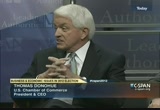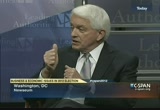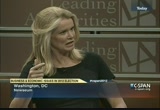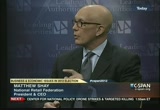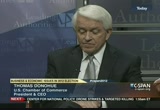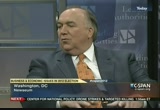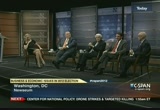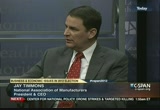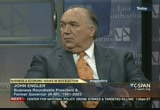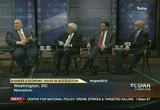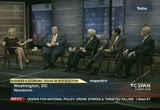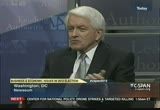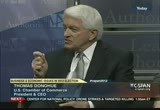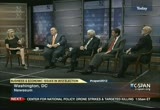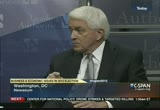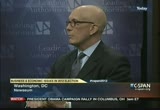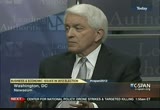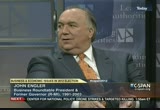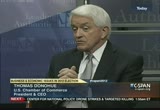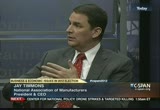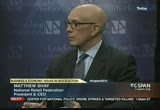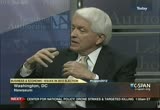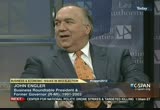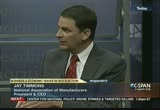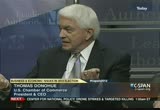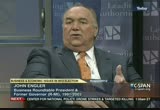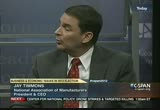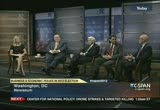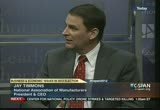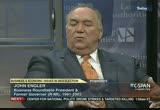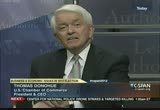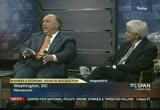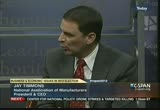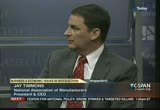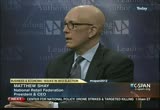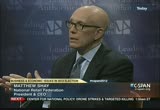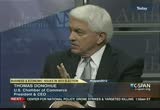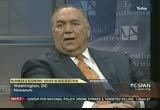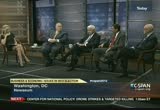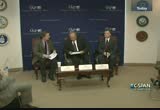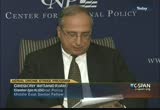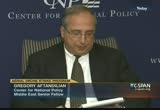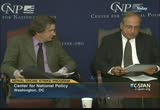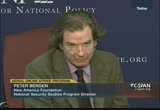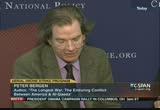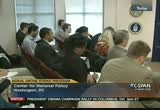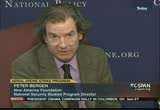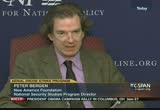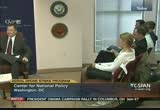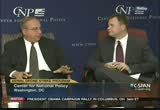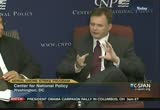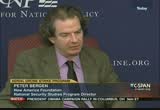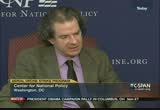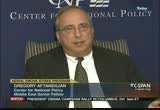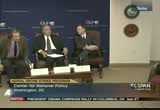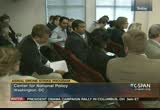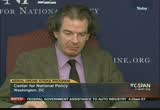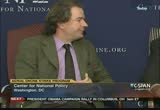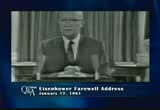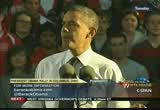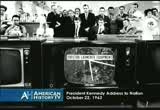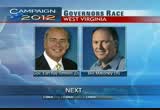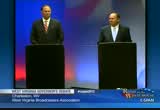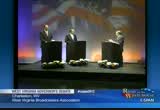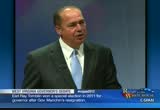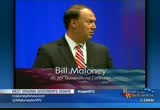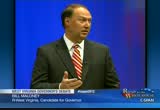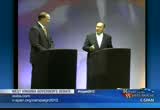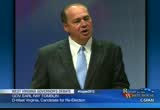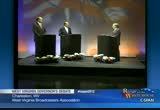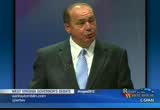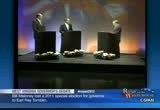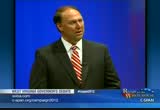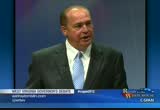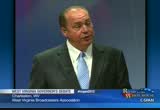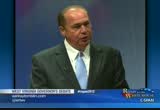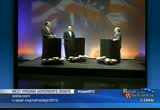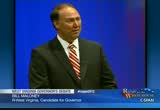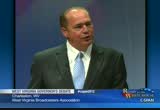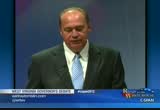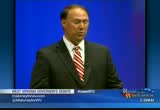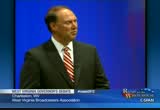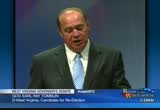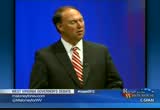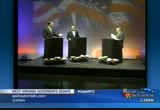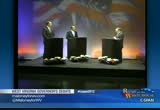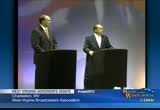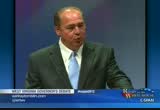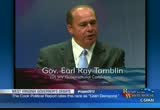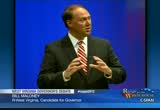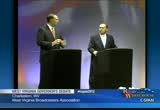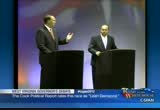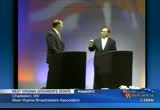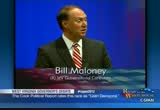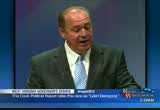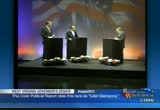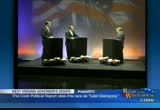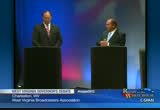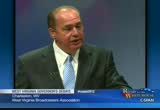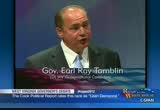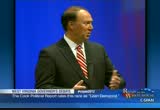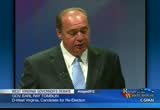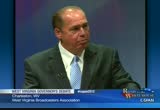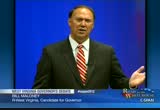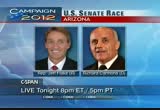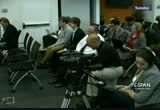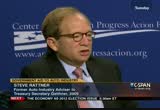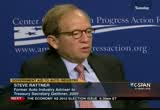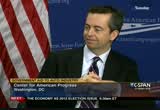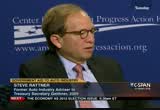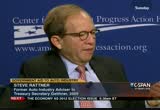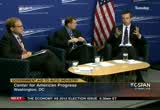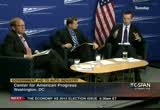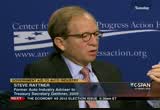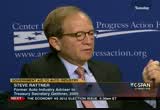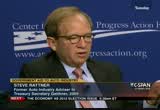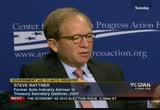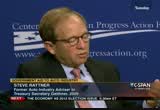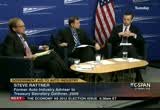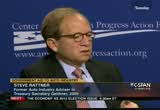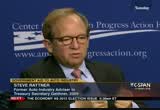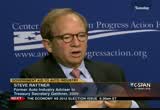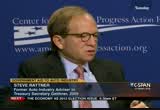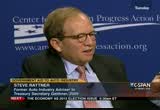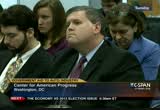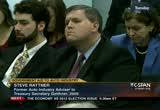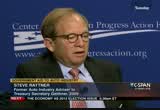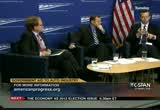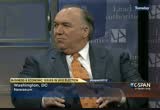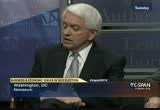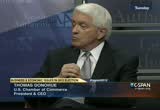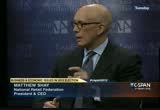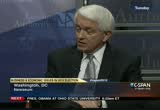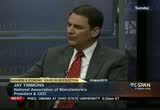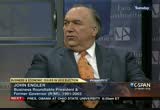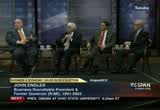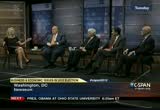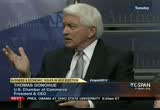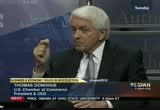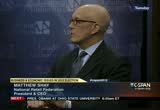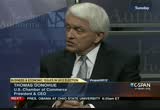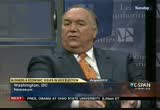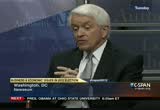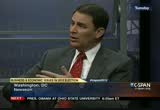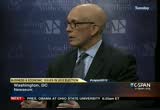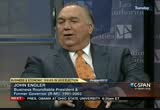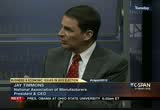tv Capitol Hill Hearings CSPAN October 10, 2012 1:00am-5:59am EDT
1:00 am
of our citizens to not have a job or are working part-time. why is that? the point you made about the global economy is critical. europe is our largest export market, and it is in a slow decline that will go on for some time. china finds europe as their largest export market. we have an extraordinary relationship with china, with our exports. all of this is under challenge. the fundamental issue is to understand if we get rid of uncertainty, if we step up in a clear way and decide what we're going to do about our unemployment by using energy, by expanding tourism, by working hard to change our regulatory system, and if we face the fundamental realities, we can fix this. we only need one thing.
1:01 am
we need leadership in the white house and congress. we need leadership in the business community. >> can this come significantly down? >> you asked if this is the new normal. >> that is the choice americans are going to make on election day. i think most americans would say no. the american spirit is alive and well. that will help us grow the economy. but you have to look at some fundamentals. for manufacturers it is more expensive than any other country in the world. that is after you take out the cost of labor. when you look at our policies on taxes and energy and our regulatory regime, at those are the things making it more expensive. makes it difficult for them to invest and create jobs. it is not just manufacturing. you see that across the entire business community. >> is that it?
1:02 am
fix those policy issues, and whatever else is happening in america will be extended again? >> this is a bright spot. we should recognize that and embrace it. this is an opportunity for us to leave and emerge from the session. -- the recession we have been fighting our way through for five years. we can reestablish this economy as the leading economy in the world. there was a lot of attention paid to the numbers last week. the important point is 7.8% is good if it comes down. we have to look at the bigger number which is much higher. that is the more troubling number. i note some have been out for 27 -- almost 5 million americans have been out of work for 27 weeks. they have become much more difficult to import. -- employ.
1:03 am
we have a mismatch. if we're going to look at numbers, the way to fix this is not focusing on employment. it is focusing in on growth. the g.d.p. was 1.9% in the first quarter. it is revised down to 1.3% in the second quarter. we should be attacking the gdp in growth number. employment is an output of growth. we have to concentrate on growth, not unemployment. >> if you're all saying the policies are wrong get america still the single biggest bright spot, might it be right? >> it might suggest we have the most innovative people in the world, at that we have an extraordinary university system, that we have the greatest collection of entrepreneurs in a structured society. i mean the small business group in this country is phenomenal. we are doing as well as we are doing and facing what is going on in the rest of the world despite ourselves. we could do much better. >> do we want to continue to do
1:04 am
as well or do we want to grow? countries all around the world are working overtime to take away our economic leadership. this is what is missing in washington, recognizing that this is a world economy. everybody wants to take from us what we have. which makes perfect sense. we have had a very strong economy. we have a great standard of living. we should be focused like laser beams at making sure that we maintain that in grow that. but we are not right now. >> in 1986 as a last time there is comprehensive tax reform in america as it relates to the business factor. at that time, we were indeed around the world. -- we were envied around the world. we have these incentives for research and development. everybody around the world took
1:05 am
notice. they have been working away. a couple of weeks ago the swedish government announced they were what began lowering their corporate tax rate because they have to come pete in the eu -- compete in the eu region. we have been stymied. this is part of it. today, we have a situation where 40-some provisions of the tax code expire at the end of this year. 60-some expired a year ago. he really did not even have a tax code in the country today. he talked about the uncertainty he mentioned. this is for medium-sized business. what are the roles? it is like we're playing with the replacement referees and the irs. tell us what the rules are. >> i hear them saying we should emulate the swedish model. -- i never thought i would hear you saying we should emulate the swedish model. >> or the french or the others. >> the insidious europeans. >> the point everyone is trying to make is that we created most
1:06 am
of these problems for ourselves. we should not be discouraged by the opportunity to resolve these issues. we should not be sitting around crying in our soup. we have to get up and pick ourselves up. if we fix the tax code in this country and if we establish a clear path forward, and says will invest. -- businesses will invest. they will take this off the balance sheets. they will start lending its. we can grow our way through this. this will require us to establish a tax code that makes sense. the retail industry pays the highest tax code in the world. at nearly 40%, on a marginal bases, -- basis, we cannot be competitive that way when the rest of the world is at 25%. everyone agrees it needs to be fixed. we need to step up front and lead. >> i here all speaking about uncertainties.
1:07 am
i travel around the country and speak to small business owners as well. they tell me, we do not know what is going to happen -->> we do not what is going to happen. we do not want to make investments. we do not know what the tax situation is going to be. i have heard other people say to me, there is something and that uncertainty. there is also reluctance to put your money down. we know businesses are sitting on a lot of cash. is it really be uncertainty about taxes and health-care that is preventing businesses from investing are is that something of an excuse? >> i would say it is those things because labor rolls -- rules. it is the epa and the laws. >> regulation. >> it is not just uncertainty. it is fear of the worst-case scenario coming down the pike. the worst-case scenario is that you do not do with this and their unbalanced tax system.
1:08 am
you let the regulatory regime continue to squelch entrepreneurs. you don't take seriously our long-term energy needs and demands and create an affordable and reliable supply of north american energy. >> you fly right off the fiscal cliff. >> it was a shocking experience for a lot of people to go back a few months. the first time we hit the debt ceiling, all the seven whether you were a lender or somebody here who is proud of the way this country had managed to fair, all the sudden policy makers are running right at to the edge. you cannot pay your bills. there is nobody in business that would be allowed to walk away like that. what we're saying is that people in charge of both parties said it takes leadership and the execs -- in the executive branch. it takes leadership. the decisions have to be made. i see governors in both parties
1:09 am
have legislative bodies of varying persuasion. they've got constitutional restraints. they have to balance their budget. as difficult as the process is, they are working through its. in washington we do not seem to be able to work through everything. the stakes are so much higher here. you want the states to succeed. the national government still has to be a barrier and an obstacle. >> you mentioned some earlier in the business is technology and metal side of things. -- medical side of things. the chinese have a 40-year plan for medical technology and innovation. we cannot have a 40 day plan here in washington. >> in the health care bill we say everybody else in the world would celebrate that and say how to expand our lead globally? what do we do? we hit the medical industry with billions of dollars of new
1:10 am
taxes. the fda slows down approval by at least two years an additional comparison. go compete in cd can still be leaders in the world. pretty tough to do. >> the health care bill is a perfect example of the government getting in the way. thingk about dictating to an interest company everything. -- ask insurance company, every dollar you spend you must only spend 15% on administrative costs. we the government will decide that on your behalf. there's not a better example anything that has happened and the health care bill when comes to the government being in the way of businesses and entrepreneurs. >> you have all outlined the worst-case scenario. we mentioned earlier the fiscal cliff. that is what is leaning come november the seventh. they are already working on it. i have been surprised to read press reports which have suggested thatsome republicans
1:11 am
were already saying they will agree to those tax cuts. -- cuts being ended for the wealthiest americans. >> i think a lot of people you're talking about are not only leaders and the republican party but leaders in the business community. they are making the mistake that has been made by many others before them, and negotiating with themselves. they want to be seen as leaders. they want to be seen as an agreeable and knowledgeable about the problem. they are saying we will make this deal. the guys on the other side are up on the hill. they are saying, just let them keep talking. after that we'll probably be in good shape. >> a bad negotiation strategy? >> in this town it is. it is nice to appear to be friendly and want to get a deal.
1:12 am
that does not bother me. when i sit across the table, my theory is not to let people have our way. [laughter] it is fine what they're doing. a lot of those people will not be in the room. it will be interesting how we get it to go. i look forward to getting down to the realities. it will not happen until november the seventh. we are talking to a lot of these folks. they're all getting together. they are going to take out some ads, and do all that stuff. the bottom line is we're first line to see who wins. that is going to tell you a helluva a lot of stuff. in the house, in the senate, in the white house. then we are going to figure out what marvels we have to play and then we're going to try to make it happen. i think we're much better served talking about the issues and not what we're going to get up. on the tax side better remembered that on the top group of people what it is is a lot of small companies that are llcs and take that money out and roll back in.
1:13 am
we need to be careful we know what we're talking about. >> this is lost in the presidential debates when we are talking about the tax code. 2/3 and manufacturers, and we hear everybody who is running for office at any level talking about revitalizing a back strain. -- manufacturing in this country. 2/3 pay the individual tax rates. if you raise taxes on the supposedly wealthy, you are a disincentive to manufacturers for raising jobs. resell is the same way. -- retail in ths same way. small businesses matter in this country. they are the job creators. you cannot penalize them for taking risks and creating jobs. >> your also worried about the deficit. clearly america has large and
1:14 am
ever-growing deficits. the proposed a tax cut. that is defecit spending. >> this is a two-step deal. everybody knows we need the big deal. we talk about that and 30 seconds. we're not going to get to the big deal by jumping off the bridge. what we're saying is that it is not the right thing to do to have the largest tax increase in the history of america and to have up $1.20 trillion worth of spending cuts that do not even look at medicare and medicaid across the board without thinking through what is the deal is going to be. anybody from either party should come to a realization that the big deal counts. all we need to do is get a small part of an extension. when you talk about these taxes and spending, it cannot be done by 10 people in the back room.
1:15 am
it has to be done in normal order. they are the only people that understand what you're in those bills. >> to and if you really think we're going to jump off a fiscal cliff? >> i think it is at least that the tax cut scheduled to expire to expire. maybe slightly higher. >> you have members of leadership on the hill saying that this should happen. in an economy in which manufacturing makes up a lot of jobs, there is 42 million retail jobs like macy's. consupmption is 70% of this economy. the positive word they use is "cautious" because of the concern about where this country is going to go. we have people walking around the hill saying, we should let this happen. the chilling effect does not cover it in damages of psyche.
1:16 am
>> there is a chance that we end up with the sum of governments that we have today. we have barack obama back in the white house, democrats are holding the senate, and republicans holding the house. can you outline what you would like to happen? the thing that would be the easiest if we had republicans in the senate and in the white house as well? what happens if you have to do business, and especially with the divided government we have had? how come to get things done in washington? we have not been able to get things done in the last four years. >> the reality will face us
1:17 am
because of the things you have been talking about. we are either in making a big deal or we are not. we are either getting the debt limit extended or not. we are either keeping a more modest but fairly important economic growth, or we are not. those issues are going to bring people to a fundamental reality that might be the same structure, but i hope not. it may be the same structure or division of authority, but it is not the same time. with it. -- you can either fix it or live with it. >> if we have the same make up that we have, politicians would come to january and think that doing a deal -- the tax code, regulation, energy, immigration -- issues all of you believe should be fixed. do you think america can do
1:18 am
them? >> we have a lot of committees. >> assuming that there is a bipartisan committee in washington. >> you have chairman cantor and chairman baucus talking. i think they can work out of corporate solutions in the tax area, if they were given the freedom to do so. you have a new ahead of the treasury. a lot of things are up in the air. i think it is a question of if there is a willingness in a bipartisan commission. if we go back in history, there are very few major accomplishments that have been made with the absence of leadership. that is a very short list. if you have a new president, or you have a re-elected president, what changes? what changes the day after?
1:19 am
how will that manifest itself? that is a complete unknown. >> it is not totally unknown. whoever is president and leads both houses in congress, they have the looming debt issue where they will run out of money. when they decide, we will fix that, finally they will say, we need to have some give and take. they will look at the problems all around the world and not just economic problems. from what everyone is saying, the european issue will not be getting better for a long time. look at china today. they just announced an hour ago that another 47 billion in their banks on top of the party some billion that it but in a week ago. you can see what is going here.
1:20 am
put on top of that what is going on around the world. i have a hunch that whoever is here will be looking to people to cooperate. >> otherwise, financial markets will look at america and say to the politicians, if you cannot fix this -- >> the markets have stayed at a certain level based on the belief that we will fix this. if they lose the belief -- >> let's talk about a couple of specifics. energy reform, for example. it is so mired in politics. jay, do you think some politics should be taken out of this? x. i do. i think energy security is advisable to not only quality of life, but also our national security. >> i think there'll be some agreement going forward. the keystone pipeline is a perfect example of this of sound energy policy. politics got in the way.
1:21 am
there seems to be an emerging consensus that we can beat north american energy independent within the next few years as long as we do things right. the devil is in the details. make sure you do not raise taxes on energy producers. when you do that, you raise taxes for all consumers. from a manufacturing standpoint, we have a stake in this. we use one-third of this nation's energy output. any time energy costs increase, the costs of manufacturing increases. of course, the regulatory burdens are enormous with the energy industry. getting that in check will be vital in the next four years. >> can you discuss immigration reform? >> i would be happy to talk more about energy policy. consumers, the determination of
1:22 am
their retail spending -->> gasoline is the biggest one. there are some in the retail industry in which you can draw a straight line. the sales the go on, and the jobs that the creative. -- that gets created. that is an important one. i think on immigration, that is one that has not gotten a lot of discussion. there is a mismatch in this country between the skills of the people that are coming out of school today and the jobs there are. there are 3 million jobs that are vacant and need to be filled with the people that have math and technology and engineering backgrounds. the students that come around the world steady in our schools and garden and go back to their country. they do not stay here because we will not let them. that is to be addressed. >> you all agree that immigration reform needs to be addressed. will it happen? >> governor negligence.
1:23 am
-- governmental negligence. >> it will. >> i think it will. >> something on the top and something on the bottom. bottom line, we are getting closer to having to do a reasonable immigration bill. i think it will happen whenever "when" is. >> an order to get immigration reform, we will have to take a very hard look. clearly, business cares about this piece of. -- about visas. frankly, there will have to be a lot of concessions. we need it all. the republicans have to back off that cliff. can we move back to the energy? >> everyone has to do what they promised people that they would do. they have promised immigration reform. what we have to do is write the bill that cashes in on those promises. it is government negligence to educate its foreign students and require them to leave.
1:24 am
no place should do that. it is part of the economic strategy for growth in the future. you want to be a magnet for the best talents in the world. we will compete for the best talents. we have the best environment for that talent. >> energy and then campaign finance. >> you are looking at california right now. their massive increases in the costs. when consumers are paying for gasoline, they're not able to purchase their basic commodities every day. what is happening? governor brown is proposing a relaxation of regulation that impact energy industry. that is clearly a concession that regulation drives the costs of energy.
1:25 am
we need to have the same focus of discussion in washington. what is happening in california can happen -- >> it is harder to buy gas in california and hawaii, from what i heard. -- than hawaii, from what i heard. >> if you have a stool with two legs, it will fall over. look at what the canadians did with their cash cow. we have more of a cash cow in energy than anyone. we can do spending, taxes, and energy with our cash cow. we can make a real deal. >> tom, you think this will happen with the makeup of the government we have today? >> i think when people figure out there is a big chunk of change and there is a debate of people trying to protect entitlements and those trying to kill energy, who are you going to bet on?
1:26 am
>> in california -- it will save as much as 50 cents per gallon. just allowing the winter fuel blend to be used early. they pay as much as $5 per gallon in california. >> it is like the europeans. >> california is america, if we do not change. california -- it is a scary thought. we can see the future. look at california. no one would want to go there. part of the answer for california is stop trying to be the federal government. they could sit a lot of money if they pull back from their own agencies and regulation. i do think we have this opportunity. it fits under a growth lead, if you will.
1:27 am
it is happening at the state level. you take that energy research and say, now i can fix some of those infrastructures that are piling out. if we start doing that, we will be short on labor in this country. we will need to retrain those people who are not trained or skilled up. the potential is enormous if there is any vision in the leadership. >> i want to ask about a store and the front page of the new york times on campaign finance. there are small super pacs run into congressional races. all of you have been previously involved in congressional races? what is the rule for business in government and election campaigns ?
1:28 am
>> we are all out switzerland. >> there has been some major effort going on for some time in various ways to force business to back away from participating in the process of government. that loses sight of the fact that the constitution fundamentally guarantees us the right to petition the government. the constitution's fundamental the agrees as the right to petition the government and the supreme court continues to support that right. why do people not want us to do it? for years, people in business were reticent. we started getting organized. wait a minute. we did not invite them to the party. we like our deal. we will win our elections. good luck. it ain't happening. american businesses are beginning to see that if they do not play in the game, someone will steal their lunch. >> that is a good thing that american businesses are getting involved.
1:29 am
we do not have the political action committee, but we are forming one. we have had a debate about this for 40 years. manufacturers are very concerned about the future of the country. they believe that they need to have a voice on those issues that we have talked about -- taxes and energy. the only way to do that is to get into the game. we need to point to the american people what we need to fix in order to invest in the united states and create jobs. >> i can tell you from my own experiences as a governor in a competitive state that our best teachers were that labor unions. then later on, and george soros. he taught everyone in america. you cannot afford to sit on the sidelines. go for it, i say. >> we do not do endorsements. we have pacs. we encourage them to be involved.
1:30 am
if we are going to address any of these issues, maybe we can get something done if everything looks exactly the same. it is an example of people having a better understanding of our position. that is why been we have engage our membership on it. >> let's go to questions from the audience. please raise your hand and give me your name and your affiliation. and that would be wonderful. there are microphones. the lady with the red jacket. >> good morning. i am the ceo of women's and structural owners association in alexandria. there has been a lot of discussion about the size of government and how do we get the money that we need.
1:31 am
what about the discussion of cutting the size of government? it is too big. in any downturn, all the businesses and cut staff and cut expenses. government has not done that. they have increased their expenses. >> we need to look at medicaid. it is a big storm of debt in our country. there has to be a focus. i think entitlements will need to have a serious look. reform will be necessary in order to change the way that we are spending money if we want to continue to ensure that those who need to benefit do benefit in the future. everything can be examined. every business in this country examines what the are spending money on.
1:32 am
they make sure that their processes are lean and that there is no waste. government can do the same. i have work for a former governor. states often times lead the way on civil responsibility. >> the role of government is one of the big issues in this country and whether you believe government helps or doesn't. it is a fault line in the country. people talk about cutting spending. in terms of their programs, they do not want to cut. even in the example of governor romney is suggesting that if we had spending cuts in defense, it would kill jobs in virginia. >> that is where you need leadership from the top. i will point back to the governors. successful governors do two things really well -- provide leadership and propose a bold initiatives to their legislatures.
1:33 am
they also have a strategy or a blueprint, if you will, for economic growth for the future. those are the successful governors. >> no president has had the reorganization of authority since ronald reagan. it expired in the 1980's. i think that needs to come back. i would put back the authority lost after the nixon area -- era. there has got to be a combination. you cannot leave the size and the structure of the garment we have in place. this is a government functions on an old model despite a 20 per century technology model. it is painful and slow. look at the demographics of the federal work force.
1:34 am
they are aging. attrition would take care of a lot of this, if it could be accompanied by risk management. president obama, the largest management he has -- he has run the latest -- >> speaking about governors becoming president -- [laughter] >> i am very partial. >> next question. let's get a microphone to you. >> i consulted in lobbying. you talked about energy. we have enormous potential to develop our energy resources. it seems that a lot of it is a communications channel.
1:35 am
when you have a lease, that does not mean that you will find the oil. we talked about having enormous reserves. it takes a long time to find the energy and develop it. it is very expensive. how do we better communicate that to the average citizen? and that will be key in the order for us to have sound energy policy and develop our resources. it can benefit all americans. >> the chambers is very active in politics, but we do not do presidential politics. if you spend all your time beating up the current energy system, while putting $92 billion in something else, i mean the fundamental reality here is we know we have a lot of this energy. if we do it right, the country owns 68% of the land.
1:36 am
we do it right by hiring people. the companies will pay taxes. we will pay royalties. it will take time, but we are talking about a 10-year deal on spending and taxes. it ought to be on energy. beating up what works is not what we will have to do. we will have to double down on what will work. >> the dramatic explosion in energy availability has come on the drilling on private lands. if you start to bring in federal lands that can be available, there are literally millions of acres of wilderness land still available while you open up millions of other acres for exploration.
1:37 am
it is a win-win situation. after the gulf, we had a slowdown on federal land. all it takes is the right attitude and let's get this done. of course it has got to be done. it will be done in an environmentally appropriate fashion. we are the best in the world at doing exploration in environmentally sensitive areas without damage. >> next question. >> while we are waiting, let me jump in on the energy discussion again. you cannot have eight serious discussion about expanding energy supply and making it affordable and reliable by demonizing success. you cannot call out a specific
1:38 am
claim in a major form for their own success. we have a bounty of energy resources that we did not even know and about five or six years ago. we are talking about shell natural gas, of course. that will provide us years of unfettered supply. we have an obligation beyond that. instead of demonizing success and characterizing energy companies as anything other than what they are, which is providing an economic boost to this country, we need to look at an all of the above approach. fossil fuels are essential to our ability to compete as a successful nation. alternatives, nuclear. no one talks about nuclear. we need to have a strategy in place, which would be endorsing for the department of energy to do. we have not seen that in this country. >> we have the greatest
1:39 am
conservation in the world. the business community --it has led the way in energy conservation. >> i think of the communication side is missing. that is something the public is not aware of. that is a question of how to do a better communications job. that is exactly what you need to do. i have one more question for all of you. please feel free with the questions. you have a great paddle up here. take advantage of them. i hear this from a lot of individuals. access to credit. it is incredibly hard. what are solutions to that? >> there is a question that the ease of access to credit -- right now it has swung too far back the other way.
1:40 am
consumers need access to credit to grow their business. we need to have a more responsible conversation with the banks and the lenders about what kind of loans they are making. you have to appreciate that they are in a tough place. on one hand, you have consumers and businesses saying, we need more credit. on the other hand a policy makers and lawmakers saying, do not make bad loans. i think they need clarity just like everyone else does. if there was a sign of clear growth going forward, also of an as institutions would say, we can go ahead and invest more on behalf of the people that we represent. on the absence of some clearer path of growth, they do not want to make any loans that are risky. there was a provision in 2009 of the penalties winning too far away. if you were a stay at home mom
1:41 am
so you could be married and have a full-time companion, if the other person worked and you stayed home, you cannot have access to credit because he did not have a job. that has been fixed. that is one thing that i think they did right. that is one small example of a credit issue. >> dodd-frank is written in anger. it was. people were angry. the second thing about that -- it had a lot of new regulations and hundred 50 some suggested new regulations. >> many of which have not come into play yet. >> of course not. we're still just getting warmed up. [laughter] if you are running a bank, there are now five regulators.
1:42 am
all of them are different. when bunch comes in and says, you need to lend some money. the other guys come in and says, when you get the rest of the money back from the loans, we will lock it in the vault and not lend it to anyone. you would not want to run a bank come up big bang, bang, any kind of bank. -- run a bank, a big bank, small bank, or any kind of bank. we are just getting started. we have more regulations and restrictions to build. we have more regulators to hire and you wonder why companies are sitting on trillions of dollars worth of money? >> ok. we have time for one last question from the audience. the lady in the gray jacket. >> hello. i work with leading authorities. most americans would agree on two things if you look at the polls.
1:43 am
one is that we need to get jobs created and our business back in order. the other is the most americans believe that it would be okay to raise taxes on the wealthy 1%. why are those in each of the exclusive? why do we have to have that discussion where we have to lower taxes and personal income but not on the business? i think what we need to have it both ways. >> tom, i will give this one to you. it will have to be brief. >> it is simple. history shows when you raise taxes on the 1% of people that pays 42% of the taxes, you will collect less money. the big fundamental issue is, what are we doing on the constructive part of the economy? we have to address them. >> ok. >> george bush entered into a
1:44 am
deal that was supposed to be balanced. the trade-off was reduce spending. the higher taxes were immediate. the reining in spending was to come later. we are still waiting. the negotiations are very complex. there are a lot of pieces to it. everything is going to end-of being on the table. there is no question that you need to curb long temp entitlement costs. it is the number one spending program in the government. that will need to be looked at and a whole bunch of other things are complex. you cannot do one without looking at everything. >> very briefly i want to ask the things you think need to be done to restore business competitiveness over the course of the next four years of whoever wins the presidential election on november 6. >> i am 100% certain they can all be done.
1:45 am
will they? i think there will be enormous pressure for the business community. this is an opportunity. 2013, in many ways, could determine the first half of the 21st century in terms of economic growth and opportunity. this will be a very good time for america if we make decisions. if we dawdled of missed opportunities, we are doing our children to a less than stellar future. >> i am optimistic. i believe circumstances around america and the world create an environment where whoever is in authority and power have to act or pay the price.
1:46 am
>> i am optimistic. i do not think the american people will settle for anything less than success, and they are going to drive this debate. as business leaders, our job is to insure the business community is involved in the discussion. if they are, politicians will do the right thing. >> to you think american politicians will do what is needed? >> you will not find pessimist'' up here. we would not do what we do for a living. the problems we face can be solved. americans can be counted on to do the right thing after they have exhausted every other possibility. we would get it done. >> you can never go wrong ending on churchill. thank you for joining me. [applause]
1:47 am
>> thank you all for joining us for conversations and power today, and a big thank-you to a keen observer on washington politics and the economy, as well who as a great moderator. and thank you to our panelists. we really appreciate you all being here. i would also like to again thank our sponsors at bloomberg government, the roth political report -- and a reminder that if you enjoyed today, we do this for state of the industry conferences. a reminder -- in four weeks, election day will be held. a couple of days afterward, we will have a major event at the chamber, on the morning of november 8. we hope you will mark your calendars and join us. thank you very much, and have a great day. [applause] [captioning performed by national captioning institute] [captions copyright national cable satellite corp. 2012]
1:50 am
anniversary. i have been listening to washington journal on the morning commute for years. tell us about the program in that people can hear on c-span radio? guest: as you mentioned, washington journal every morning. three hours of interviews, news updates, and your phone calls, e-mails, and tweets. we cover a variety of events from capitol hill, and public policy events taking place all around the city. for example, chuck schumer will be speaking about the presidential election and tax reform, and we will have that live on c-span radio. speaking of the presidential selection, we cover all of the debates. our preview, of the vice- presidential debate begins at
1:51 am
7:00 on c-span and c-span radio. we have special programming every day, "washington today." it is a news and interview program. we invite you to listen in and call and as we catch up on the latest news of the day. supreme court oral arguments air on c-span radio. this week, the high court is hearing an argument on affirmative action. that will take place tomorrow. the court releases their oral arguments once a week, and you can hear the case on c-span radio at 4:00 on friday. saturday night, "american history," followed by "book tv." we replay "meet the press" and more, sunday afternoon.
1:52 am
host: c-span radio is aired here in washington, d.c. if they do not live here, how can they listen? guest: new technology has made the radio station available on a number of platforms. you can listen to us on satellite radio and find us at channel 119. if you have a smart phone, you can find our apps. you can listen that way. also, you can dial in and listen to our station on the phone, and online. and of course, here in the d.c. area, on 90.1 fm. we are on hd radio as well in the washington area. we are on radio hd 1. when the house and senate are in session, you can hear them live on hd 2 and hd 3.
1:53 am
host: thank you so much. it is the 50th anniversary of c- span radio. we will be right fact -- the 15th anniversary of c-span radio. >> i watched the deliberations and all the information put out by the think tanks here in washington, d.c. the pilot the interviews on sundays at 8:00, where there are different authors and discussions about the books, they have written. it is just an easy way to get information in those books without having to read the books. >> c-span, created by america's cable companies in 1979, brought to you as a public service by your television provider.
1:54 am
>> this government, as promised, has maintained the closest surveillance of the soviet military buildup on the island of cuba. within the past week, unmistakable evidence has established the fact that a series of offensive missile sites is now in preparation on that island. the purpose of these bases can be none other than to provide a nuclear strike capability against the western hemisphere. >> do you ambassadors denied the u.s.s.r. has placed and is placing medium and intermediate range missiles and sites? a yes or no? do not wait for the translation. yes or no? >> 13 days in 1962, live sunday from the jfk presidential library and museum, on the
1:55 am
anniversary of the cuban missile crisis. >> two counter-terrorism experts said the obama administration use of ground strikes may be undermining security objectives in places like yemen and pakistan. peter bird and and christopher swift discuss the move from partitive killings to signature strikes, which target groups ahead of men associated with terrorists. according to research, and grown strikes in pakistan have increased from one every 40 days during the bush administration to one every four days. this is from the center for national policy.
1:56 am
>> good afternoon. my name is gregory aftandilian. i am a senior fellow for the middle east here at the center for national policy. on behalf of our chairman, and our president, i want to welcome all of you here today. i also want to welcome c-span for covering this event. the event is titled, "death from above." as many of you are aware, drone attacks started under the bush administration but have been accelerated under the obama administration. they seem to be the main weapon of the united states against al qaeda and its affiliates in pakistan. we argue that drones have been effective, according to data.
1:57 am
somewhere between 1597 have been killed by drones since 2004. this includes some of al qaeda's top leaders and foot soldiers. on the other hand, there has been what has been euphemistically called collateral damage. in 2004, the non militant casualty rate has been 16%. the non militant death rate has fallen dramatically since 2004. it remains a highly sensitive issue. there are many controversies surrounding the drone campaign. the first is the morality of the strikes, especially concerning non-militant deaths. second, the question is raised, is the united states making more enemies out of the civilian population than would otherwise be the case? third, the legality of the drug operations themselves. fourth, what about the sovereignty issue?
1:58 am
they presumably have the acquiescence of the governments of the countries where the attacks take place, are they hurting national pride in these countries and are they being used as a political issue by political actors against the united states. we saw over the weekend that the four pakistani cricket stars were now an issue. they tried to organize a march to protest the drone attacks. will more pakistani citizens tried similar attacks? we are fortunate today to have a distinguished panel to examine these questions and other types of questions concerning the drone attacks. i would like to introduce the person to my left, peter bergen, the current director of the national security studies program.
1:59 am
he is also a fellow at the university center on national security. as many of you in the audience are aware, he is the leading national security analyst on cnn. peter bergen has been covering al qaeda for many years since he was a journalist. he interviewed bin laden. this was the first interview bin laden gave. in addition, he has written many books on the subjects, including "man hunt." several of his books have become "the new york times" best sellers. we are pleased to have him here
2:00 am
today. to my left is christopher swift. he is a fellow at the center for national security law at the university of virginia law school. he holds a bachelor's degree in government and history. a ph.d. in politics in international studies from cambridge university. he is the author of an upcoming book. he is the author of an upcoming book. most recently, he did field research in yemen, which he will be talking about today. he has served in the u.s. treasury department. thank you very much.
2:01 am
we are pleased to have you, as well. without further ado, let me turn to peter bergen for his comments and insights. >> thank you for the introduction. i wanted to talk about the american foundation in terms of drones. [sirens] can everybody hear me? 2004 was really the first drone strike in pakistan, authorized by george w. bush. not a single drone strike has occurred outside the areas. that is one of the reasons i think he used the acquiescence in the strikes. i think there is acquiescence by the pakistan government. it would very quickly change if the drone strikes changed and other tribal regions.
2:02 am
they are referred to as foreign area. constitutionally, the regions have never been part of pakistan proper. there would be huge push back if drone strikes started in -- pakistan has f-16s. there is some degree of acquiescence. the days of acquiescence in pakistan are fading, as you know. the united states has a 90% in april rating in pakistan. down about 20%. it was voted to essentially and the use of drones on the territory.
2:03 am
the united states government has ignored that. there was a drone strike about once every 40 days under george w. bush. under obama, there has been a drone strike about once every four days. how do we assemble our data about drone strikes? we rely on pakistan and news sources, cnn, and also pakistani newspapers. it is where many of the farm fighters are based themselves. it is the least well poised to do military operations. they have done serious operations. the fact is, there are relatively limited operations. over a third of these strikes have killed members of the taliban. recently, a pakistan major- general acknowledged for the first time officially that the numbers of people is relatively low who are killed.
2:04 am
just to get into that in a little bit more detail, under president obama, this seems to be a shift away from al qaeda. about 25% of the targets were al qaeda, 40% were taliban. that was under torture of the bush. under obama, just over 50% for taliban targets. the number of military leaders who have been killed has been declining overall. it has only been 2%. 49 militant leaders have been killed.
2:05 am
2:06 am
this is a controversial point. some people have criticized us for our claim or our finding case on reliable medium reported. 2% are called on known. no one is criticizing us except the defenders of the drone program. 3% under president bush. some of these drone attacks, it seems to get lost in the coverage, are very much in pakistan's in trust. the pakistani taliban has killed something like 30 people in the last several years.
2:07 am
the leader was killed in a cia drone strike. he authorized the assassination in 2007. the number of strikes is declining. it went down 40% in 2011. why is it declining? several factors. there has been a debate within the state department and the cia. the state department one to some degree. they are saying we overuse the tactic. will there were other factors that cause this decline.
2:08 am
there has been increased congressional oversight. it was said the committee has 28 oversight meetings to examine this in detail. another detail here is the declining number of targets in the tribal areas. you would have to be pretty stupid if you were staying, or desperate, if you were a member of al qaeda or other groups at this point. just to wrap this up, and maybe zoom out further, the united states on 9/11 had about 50 drones.
2:09 am
now they have 7500, roughly speaking. they do not have armed drones on 9/11. it was only able to arm its first drone in the post-9/11 era. there was a debate about who would pay for the armed drones. the first victim of the armed drone program was the military commander of al qaeda, killed in november of 2001. the point of the anecdote is that the united states will not have a monopoly on drones. it already does not. israel has sold technology to companies like siberia. china, 2010, demonstrated it had 25 different types of drones, some of which could potentially be armed. the monopoly will disappear very quickly. it already has. the question is the president of the united states is creating with the use of drones. you can imagine chinese using drones.
2:10 am
basically deciding what the united states is doing with president. a public discussion of drones, as we are having here. it is a good thing. it is the future of warfare. >> thank you. >> thank you to the center of national policy for putting together this form and creating the type of forum where we can have a reasonable, rational debate. i would also like to thank peter and commending him and the new america foundation for the research they are doing. there are a lot of pundits in washington d.c. to have very strong opinions about the program, whether for or against drones, but very few people have actually gone out on the field and crunched the data.
2:11 am
peter's team has done that. they should be commended. i will take a slightly different approach. i am a lawyer and a political scientist. i basically have three things i would like to do. i would like to discuss some of my observations from my field work in yemen this past summer. i would like to talk about how some of those observations resonate with some of the core principles that define the law of war. i would like to go from specific to general. i would like to talk about the debate in this world, technology, and policy. on to yemen. i have been researching a book. the object of the book is to unravel and untangle the webs in
2:12 am
networks we have seen develop since 9/11. a very important case study in that research is yemen. it is a place where al qaeda has shifted to following afghanistan and pakistan. also iraq. as a result of that shift, and a generational shift after the death of bin laden, we are seeing new strategies. they are operating prominently in arab culture. yemen is crucial to how al qaeda is evolving and the way it is using local insurgencies. before i went to yemen, some colleagues encouraged me to look at the drone issue, as well.
2:13 am
not just a question of how al qaeda interfaces with indigenous tribes. there were two arguments. the human rights committee was making the arguments that drone strikes are the approximate cost of al qaeda's effort in yemen. there are numbers to back that. the operational capacity since 2009. on the national security side, i had colleges said, let's figure out if our drone strikes are helping us to deal with a terrorist challenge. when i got to yemen, i interviewed for the tribal and religious leaders. i found both of these narratives we had in washington, that the drone strikes helping us set up in yemen and they are causing the growth of al qaeda in yemen had no relation to what is happening on the ground.
2:14 am
what i did find is that al qaeda's recruiting is not driven by a u.s. drone strikes. not ideology or religion. it is driven by desperation. yemen's live in $60 economies. in a region that is cut off from the rest of the world, where people are living on less than 800 calories a day, that makes a difference. it is a real concern about government corruption that is pulling people into the insurgency in yemen. not drone strikes, not jihad, not ideology. all of those things are used. the second thing i found in yemen, they resent the drone strikes. they have the image of the drones and the u.s. government is standing up a government that is not accountable to them. we hear this over and over.
2:15 am
in the south and in the north. this notion that the u.s. is propping up a government that is not responsive to the population. it is fundamentally undermining our political objectives, even while securing our security objectives. neither one of them bears any resemblance to the facts on the ground. they are distorting our ability to understand the relationship between the instruments of policy and the actual substance of our objectives. our security terms and our long- term political objectives. let me summarize some of the things tribal and religious leaders told me. they are willing to accommodate
2:16 am
them if the united states can meet three conditions. no civilian casualties. not using any more force than is necessary to take care of the problem. they see it as a dispute between the united states and al qaeda. it is very individualized and particularized. the third thing is basically when you target al qaeda, make sure you target the leaders. they want to pull people away from the organization. they do not support al qaeda. they do not want those kids to become a target for the u.s. drones. they want to get rid of al qaeda but also have a functioning government, provide security for their people, and make sure their people do not get caught in the crossfire.
2:17 am
when we look at the general principles of national law and a lot of war, there are three normative constructs that we use to define what is and what is not legal. those contracts are immunity, do not kill civilians. even by accident. the second is proportionality. use only as much force as you need to remove the threat. remove only those who pose a threat. the values resonate very closely with what the yemenis religious leaders told me. when you think about international law and the law of war, we have to think not about law as about a fundamental set of rules that can never be broken. we have to look at it as a series of lessons from previous generations who fought nasty wars.
2:18 am
those lessons are avoid civilian casualties. help radicalize the indigenous population. use restraint. focus on proportionality. only the force you need to achieve your objective. know what objectives you want to achieve and do not go beyond that. we have an increase in the intensity in u.s. operations. we have a ship on target strike based on positive information, to so-called signature strikes. that may have worked pretty well in pakistan, where ethnic arabs have a tendency to stick out.
2:19 am
in a place like yemen where ethnic arabs are coming back and reintegrating into their own tribal structures, the signature strike becomes problematic. drones are a tool. they allow us to extend our reach and reduce the cost of intervening. they do not change the need for having very clear intelligence. they do not change the need to understand a local social, political, and economic standards on the ground. they do not change the human dimension of war. the relationship between a
2:20 am
population that is fighting were living amidst war, and the people who are coming out to intervene. these other questions that are being lost in the drone debate. we are focusing on the technology and proliferation. we are focusing on hard notions of right and wrong, liberty versus security, war and peace. these issues reach all the way back. they are issues about how we fight and when we fight and how we know it is ok to fight and what tools are ok, given the context. they are all policy decisions. we need to be very careful that we think the technology is changing fundamentally a human endeavor. the fault is in ourselves. if we want to have affected policy in places like yemen and somalia and pakistan, we have to have a richer understanding of what is happening on the ground and a richer understanding of the diversity of views and the consequences of this kind of intervention going forward. thank you. >> thank you. a quick follow up to this. you talk about the 17 to 18 year olds who get recruited and it is primarily for money.
2:21 am
they will get killed in a drone strike. is there a meeting of the minds? >> what is driving recruitment in yemen is the breakdown of tribal institutions and political institutions. you have a water crisis, an ecological crisis. the majority of yemenis are living on less than $60 a month. if you are the head of a family, a 30-year-old, and you have a wife, children, and you are living on $60 a day and someone comes into your community and says i can pay you $400 but you have to believe in jihad and carry this rifle and should we tell you to shoot, that is a good deal.
2:22 am
whether these people get sucked up and get targeted, that is an unfortunate reality. right now in yemen, we do not have a good review of what groups, what tribal structures, what regions are places where al qaeda has a lot of reach and influence. we have a general view from 12,000 feet above. you cannot fight this kind of war by remote control. you have got to have that view on the ground. it does not mean we should have the kind of intervention we have had in afghanistan and iraq. they would not make sense in yemen. but it does mean we have to have a clear picture of who our adversary is and how it relates to the local population, and the points of pressure. we do not have that here we are trying to fight the war from remote control. >> when did you do your
2:23 am
research? what is your assessment of al qaeda and yemen right now? they have suffered some major military reverses. what did you make of the president's, of the un general assembly on drones? why did he make those? president obama had no one-on- one meeting, except with them? is that correct? >> i do not know about the last part. i was there shortly after the bombing in the capital of yemen. i interviewed some of the officers. i was there until early june just before the yemenis forces went in. it was a very exciting and rich time to be there in terms of the data available. my general assessment of al
2:24 am
qaeda you can find in the article i wrote for west point, the ctc sentinel journal they put out there. that went up around july. i think al qaeda got extended beyond their capacity. they try to consolidate territory and said the system of government in the province. they were burning a lot of money in the process. they were not quite ready to do it yet. yemen has done a good job of pushing them back, where you try to consolidate power, to where you run operations. provocation operations, terrorist operations, bombings, and the like. what we have seen in yemen is not a young man army route, but an al qaeda strategic retreat back to areas where it has better sustainability and the capacity to sustain a beating.
2:25 am
the question was about their president's comments on drones. >> he made unusual comments. >> they underscore the difference between the yemeni leadership and their concerns about instability in the country, and what ordinaire yemen's our thinking in the streets. the yemeni leadership is concerned about the threat. they are concerned about some other country coming in and meddling with their affairs. there is a disconnected there. that is growing and growing. i think there president gave a very clear, factual assessment of what drones' can do and how they are helping his government take care of some security problems. one of the things i do not think he has a knowledge is the degree to which that kind of intervention and the way it is seen in society is undermining the legitimacy of transitional government with ordinary yemenis on the street.
2:26 am
>> it sounds like quite difficult research. multiple wars going on in yemen right now. how did you deal with your personal security? >> i relied on local to provide the security. when i was in the north, i had a good interpreter who had an extensive network of people who would provide some security. and we went down to the south, we moved from tribal shake to tribal shake. i was writing in pickup trucks with a bunch of tribal fighters. i am clearly a foreigner. i might have been a target. the simple reality is if you take any research in afghanistan and pakistan, if you take the time to do your homework and build local relationships, you can get much richer relationship and a broader perspective than you can rely on
2:27 am
third-party reports were hearsay discussions or other types of data. it does not mean we did not have any political actions. having seven guys with seven rifles in your truck is very persuasive. >> we are happy you came back safe and sound. [laughter] you provided us with a lot of rich research. thank you. it is time to open up for some "q&a". please identify yourself before asking questions. >> for a young american being
2:28 am
deployed for u.s. military purposes, are the rules changing? how are they acting and is there anything especially to be concerned about for them? >> how are drones changing the lives of the ordinary soldiers? >> beyond that, as far as american military. >> when we talk about drones, their use an ordinary warfare in afghanistan and iraq is quite uncontroversial. in iraq, you are talking about hundreds of thousands during the iraq war in any given year. i just bought a drone on amazon for 200 the to dollars.
2:29 am
the ordinary soldier will have almost their own drone relatively soon. the technology is already here. it is changing the nature of warfare. the libya opposition to gaddafi had their own severely strong for $100,000. if you are able -- for the ordinary soldier, drones are integrated into how you proceed in the battlefield, whether it is surveillance drones, armed drones, or both. >> yes sir. please.
2:30 am
>> uav's. i once told them we had to go to toys r us and buy these things. that was the evolution of the technology. when they gave me a bunch, i used to say, do not tell me the problem. tell me the solutions. you articulated the problems extraordinarily well. what would you do if you were in charge? that is the real crux of where we go. you cannot stop technology. i will not begin to tell you what i saw 11 years ago compared to today. >> let me break that down into three solutions. one is practical, one is security related, and one is legal. in terms of u.s. operations in these places, we have to have visibility on the ground. we have to know who our local
2:31 am
partners are. we have to have good tools to distinguish our local adversaries from them. not everybody with a turban is al qaeda. we have to have that view on the ground. you cannot fight a war by remote control. that is a practical solution. from a legal standpoint, i would say, if you are worried about the liberation of technology, we have a number of tools to prevent proliferation of all kinds of dangers. an agreement, a nuclear materials with a treaty, and with drones, we have a legal regime that says if you have a rocket system or a drone system, for a range of more than 300 kilometers, the technology on that is controlled. there are some countries where
2:32 am
you cannot export that technology. it is a voluntary regime. it is developed countries that have worried about this proliferation. if you get a regime like that from a voluntary regime to a binding regime, then international law has answers to deal with some of these problems. practical question, a legal question, and then a strategy question. what we do? i have profound concerns about the signature strikes. i would dial back those in the near-term until we have better intelligence on the ground. the thing that makes drones' a better option from a legal standpoint, a strategic standpoint, a tactical standpoint, is the fact that you could put firepower directly on the target, the source of the threat. that degree of discrimination is extremely useful from a legal and political and strategic standpoint. if you suddenly decide, we will not worry about the nature of the target, we will work on a profile bases, you start to undermine the legal legitimacy of your actions, the degree of the restraint you have, and you
2:33 am
encourage this between the short-term security and central security issues we are trying to deal with, and the long-term political objectives we are trying to achieve. >> i completely agree with christopher about the signature strikes. i would add one other point. this is the world's worst-kept secret. we are having a public meeting about the issue. drone strike are public events by their very nature. these are not things you can hide. i think it is good the obama administration is beginning to talk about this in a more open way. president obama did a recent interview where he made some of his most on the record statements about the drone program.
2:34 am
there should be more public discussion about it. there should be more public discussion at the international level to talk about the kind of regime christopher was indicating, potentially having a binding international treaty on this issue. i would add one other thing. the secrecy that has surrounded this is unnecessary, and i think it is counter-productive. why does it even exist? in the case of pakistan, it gave pakistan plausible deniability. wikileaks demonstrated that they were joking about lying about it. at this point, the plausible deniability does not exist.
2:35 am
we have the yemeni president making a speech about it. i think sunlight is a great disinfectant. >> way in the back? please speak up. >> george washington. [indiscernible] a new terrain for the geopolitics. >> i am not familiar with that event. i know the united states turned down a request from turkey for armed drones. they turned around and said, we will arm our own drones. we are right at the tipping point where a lot of countries, egypt, turkey, or others, has the technology.
2:36 am
it is not that complicated. >> i am not personally familiar with the situation, but drones' generally reduce the cost of military intervention. it is easier, like an iphone makes it easier to communicate with whomever you would like to communicate with. to the extent we have a proliferation drone, and to the extent that different countries around the world are using this instrument to pursue their policies, we are likely to see greater intensity in terms of the frequency of these operations. that does not matter if it is the iranians on the pakistan water, or the concerns about jihad groups, we will see these used because the costs are lower. the fact that the costs are lower means we have to have a much clearer sense of who we are targeting, what the possible
2:37 am
costs of taking the wrong actions are, and a public discussion about when it is appropriate to use force, and whether or not now the time is to use force. these questions read all the way back. they are not new questions. they are old questions. we need to focus on those questions and not the platform. >> let me add quickly. if there are drones that would go to egypt and the egyptian government uses them near the border, next to gossip, or israel proper, that would have to be coordinated at some point with the israelis because of the sensitivity of that border region. that would have to be worked
2:38 am
out. let's go over here. >> the signature strikes. i am curious how much we actually know about the decision making. and if we have any firm data as to whether they are actually less discriminant in terms of civilian casualties. it is obvious the signature strike is pretty awful. we routinely use those things to put people in jail. we saw circumstantial evidence. what do we really actually know in terms of hard facts about how these work and what the real differences are between them and the non signature strikes.
2:39 am
>> what we know is not a great deal. kelly can make certain assumptions. my impression is the number of signatures strikes have gone down in pakistan. there was a particularly an egregious case in march 17, 2011, which was the day after raymond davis was released. quite a number of tribal leaders were killed. it seemed to be a signature strike. my understanding is the u.s. ambassador of pakistan tried to prevent the strike. a signature strike is more likely to kill people who may not be -- it is not killing militant leaders. my impression is they declined in pakistan. i cannot tell you if they have stopped.
2:40 am
this is the problem with discussing the program. the u.s. government does not say much about it. the best reporting on this has been done on "newsweek." when it comes to individual strikes, the only way you can infer it is by the number of casualties. signature strides kill more people. >> that is possible. but it is an assumption. >> it is. signature strike -- my understanding is that the term does not refer to one person. it refers to a group of people doing certain things. the administration has come up with a new euphemism. tads. something to do with terrorism. signature stripe does not sound good.
2:41 am
there is a new euphemism to describe it. i cannot say more than i just said. i just do not know. >> i do not have an inside view of the criteria they are using to operate signature strikes. nor do i have a sense of the data. that is one area where greater transparency would be in favor of greater legitimacy. what i can talk to you about is the analogy you have drawn between signature strikes and circumstantial evidence. i can tell you if i am a prosecutor, and i have a murder, i want to prove that murder with eyewitness testimony. dna.
2:42 am
i do not want to prove that murder with circumstantial evidence. even if i get a conviction, it will be not resonating in quite the same way. it will not be seen as legitimate. will continue to be challenged. i want a clear conviction based on facts i can verify, not based on hearsay or circumstance. a legal domain involves things like due process of law. we are not operating in the domain of u.s. law. the stakes are even, arguably, even higher from a political standpoint. there is no trial. the target does not have the chance to say, do not drown me. i am from the town over. circumstantial evidence in that context, we are talking about war and peace, life and death, and the cost of getting a decision wrong, undermining our ability to build the relationships we need to achieve the kinds of objectives we have.
2:43 am
stability, security and prosperity, and that is what we are aiming for. if you do that on the basis of circumstantial evidence, it will be hard to do that. it will be hard to go to the tribal leader in that region and explain, we did it on the basis of circumstantial evidence. when i was in yemen, i interviewed a tribal leader in the south. he had put together a local militia that was literally house-to-house in their own village. they were standing up, not because the u.s. government ask them to come not because the yemeni government asked them, but because al qaeda had offended them, it was a threat to them, and they were taking responsibility in their own area. we accidentally drowned some
2:44 am
civilians a couple of weeks ago in that district. the same leader says, i can accommodate drones' if you do not have civilian casualties. it might be helpful to me if the u.s. government did the following things. he now can go and say, we need to accommodate the drones. we are using circumstantial evidence. rather than making a positive identification of who the adversary was and then taking them out of circulation. let's go back to the bigger question of international law. they are not there to restrain us or add bureaucracy. these are lessons that have been given to us about mistakes you can make in war and the kinds of precautions you can take a clear set of objectives.
2:45 am
>> please speak up. >> the pakistan population in some of these areas, it is kind of like, it is not good to live there because the drones are operating. has there been any research done or do you know whether there is more radicalization for the population of that area? >> the american foundation did their first independent poll on sensitive political issues in the tribal areas about two years ago. there were interesting. we sub contracted with a local ngo that does polling in that region.
2:46 am
the results were interesting. there was a great deal of hostility to president obama because of the drones. there was a great deal of hostility. there was also very little support for al qaeda. not much support for the taliban. one of the questions we asked was, if the taliban or al qaeda were on the pole in an election in your area, would you vote for them? it was less than 1%. quite a lot of hostility to the taliban. also, a real dislike of u.s. military activity in the region. as i have been thinking about the drone program, christopher mentioned this issue of national sovereignty, at the end of the day, that is the issue that makes people -- and do the thought experiment where canada had a drone program where they were taking out members of the mafia in new york with a high degree of success. residents were also being killed in the process. we would be up in arms in canada. that is the analogy.
2:47 am
in pakistan, it takes several different forms, from their perspective, that the united states has done for raymond davis. the osama bin laden raid, they did not get a heads up for. the killing on the border by a naval air strike, and the drone program. all of these accounts for the 9% favorability rating we have in pakistan in general. i do not think it is particularly surprising.
2:48 am
>> what peter found in their poll in pakistan in terms of the differentiation between opposition of military intervention, and a dislike of al qaeda and the taliban on a local level, is exactly what i saw in the interviews in yemen. we make a big deal out of al qaeda being a muslim organization and it is going back to arabia and it has all kinds of traction. yemenis are not following jihad. we need to understand the cultural differences. but this is not fertile ground for al qaeda in the way many people in the u.s. assume. the same thing with the taliban and al qaeda in pakistan. there is nothing quite like living there to convince you it is not the best form of government.
2:49 am
the question that is really key here is not just war and peace. they want to be able to feed their kids, build a house, built a business, they want to be able to make decisions about their own lives and political future. it is not so different for anybody around world. the way they will do that it will be different because of their culture and history and religion. but unless we get on the ground and understand these people on their own terms, unless we hear their story from the field, we will never have an appreciation of the impact our policy, our platforms and instruments of policy, has in these environments.
2:50 am
that is why i keep coming back to the point of wars being a human endeavor, not a technological endeavor. you have to understand the environment you are intervening in. that is a different kind of engagement than what we are undertaking today. >> thank you. we have started a twitter account. we have a question from that account. "what is the likelihood drones could be preprogrammed to deliver a weapon without having humans directly involved in the attack?" >> i am not aware of any plan by the u.s. air force or any of the other military agencies that are building drones to have them be automated, flying killing robots from "terminator 2."
2:51 am
there is a very strong emphasis on preserving the war fighter making the decision. having pilot in the drone. if we got down the road towards automation, i think we would have a major legal problem, but also something we should stay away from. >> it raises an interesting technological question. every lawyer i have talked to about this said the same thing. the days of hiring a hit man, but you have your own personal drone do it for you, is not that far away.
2:52 am
it is not science fiction anymore. how you prevent that, i have no idea. i do not think you can. i think the technology will move faster than our ability to constrain it from a moral perspective. >> let me come back to that and look at a different kind of weapon. a suicide bomber is a highly targeted weapon. we have a bunch of walls we have created around suicide bombing. we think it is immoral and illegitimate, and we frown upon this particular delivery mechanism. it is autonomous. a suicide bomber is autonomous. they are targeted. they are going after a particular target set and they know what it is beforehand. our response to that is to basically say, we will morally put this down, that it is not
2:53 am
something we will tolerate, and we will target its and wrap it up. we respond to these things. in ways that take a while that go from the level of tactics to doctrine to policy, and then get enrolled into law. i think this capacity to adapt to new technology, new platforms, is something human beings have been doing for the last 10,000 years. the crossbow will fundamental reason fundamentally changed land warfare in europe. we eventually figured out that it is not so much a threat anymore if you change society. it was an interesting new technology. it allowed an individual farmer, with no skill, to take out a commanding knight. it was a tremendous technological change. structure in the society
2:54 am
changed. the relationship between the population and the leaders changed. new things grew up around the technology to keep things in order. we are seeing the start of that. the trick is not to think that technology is going to define our future. we define our future. human beings make the decision about how we will live. we have the power to make that choice. >> as a follow-up, are we over estimating the impact of drones? just to play devil's advocate. the fighter jet, the bomber, the tank, changed the nature of warfare in the 20th century almost completely. and the atomic weapon. if you are the historian looking back on this discussion, would it seem over wrought that we are saying this is a big change?
2:55 am
>> it is a big change in terms of the personalization of warfare. and of increasing our reach. it is why the legal and political and moral questions we are raising are even more important now than they have ever been. we have less time to make these fundamental decisions about war and peace, liberty and security. i am optimistic. i think human beings are pretty clever to adapting to new environments and technology. >> in a sense, the boundaries between war and peace have been blurred by this weapon. look at what we are doing in
2:56 am
somalia. it is a covert war. we have not very much direct information about it. with the use of u.s. special forces and drones, we are not in a conventional war in somalia. we are not at peace with certain groups in somalia. drones' allow us to be in that position. >> that is right. the 20th century was a convention of warfare. we saw a similar thing happened in the nuclear standoff in the cold war. what we are seeing is a return to the norm, where there is a funny blending between peace and not peace and criminality and terrorism. all of these things are blended together in complicated ways. i think we are seeing a reversion back to the norm rather than something fundamentally new. we have built institutions, laws, systems of government that allow us to respond to these things. we have done it by making a decision about what our values are, what adversaries we cannot live without, and those we can accommodate.
2:57 am
we are seeing that shake out not just in terms of our policy on drones and cyber warfare and some of the new technologies. rather than something fundamental and new. we have built institutions. we have built systems of governance that allow us to respond to these things. we have done that by making decisions about what our values are, what values are fighting for.
2:58 am
and those we can accommodate. we are seeing that shake out. not just in terms of policy on an drones and new topologies but a shake out in terms of this effort to distinguish between different kinds of different forms of militants. by hard-core al qaeda to a globalized [unintelligible] versus local groups who may not resonate with al qaeda's global agenda. our institutions are adaptive but they are only going to be adaptive if we understand the lessons that have been handed to us from previous generations. and appreciate those lessons. and if we are willing to get into some of these cultures we are engaging with and understand them and what they see is the ideal future on their terms. not just our remote control. >> as well as understand the problems of the signature strikes. >> with that, we raised the bar to a higher level. it was a very useful discussion on a topic that is not well discussed in washington. i am very pleased to have such distinguished speakers with us today. thank you, the audience, for your questions. thank you very much. [applause] >> of washington journal, frank, chairman of gopac. then the washington jarrett -- bureau chief for mother jones uncovers video of mitt romney talking about 47% of americans
2:59 am
he says to not pay taxes. a health care reporter from congressional quarterly. washington journal is like every day at 7:00 a.m. eastern on c- span -- is live every day at 7:00 a.m. eastern on c-span. tomorrow morning, the bipartisan policy center releases a report on the affected iran's nuclear program on the world economy. also in discussion about iran pose a nuclear program which to come watch live here on c-span beginning at 10:00 a.m. eastern time. then at noon, a house oversight committee hearing. you can watch a live a watch it when we hear it again at 9:00 a.m. -- 9:00 p.m. eastern on c- span.
3:32 am
3:33 am
affect coverage. we bring you live coverage of house and senate proceedings. we will have live coverage of debates on the fiscal cliff. also, we bring you public policy events including congressional hearings, and there is a hearing tomorrow by the house oversight and government reform committee looking into the attack on the consulate in benghazi, libya. all of our events, like c-span, her long-form, devil-to-devil, without interruption or -- gavel-to-gavel, without interruption or commentary. host: has the mission of c-span radio grown in 15 years? guest: it has chang as technology has changed. when we first went on the a in 1997, suspend a radio was
3:34 am
5:00 am
at chrysler liquidated, they would have gotten a billion dollars or less. so there were getting roughly twice what they have gotten in bankruptcy. the same was true with the bondholders in general motors. they will end up recovering 20 cents on the dollar when the dust is over. what people objected to is the idea that even though they were getting more, some other groups were getting even more. the unions were the ones they focused on. it is established in bankruptcy law that you can give more to a
5:01 am
class of creditors then you have to, in order to have a successfully reorganized company. did we give more to the unions than they would have gotten in liquidation? of course, because we needed the workers to come to work. the workers did take substantial here cuts. a class of creditors did not take any hair cuts. you all are among them, because if you are the owner of a gm or chrysler car and you have a warranty, that warranty would've been avoided in a liquidation. you would've lost that warranty. we honored those at 100 cents on the dollar. we gave warranty holders far more than we gave uaw and bondholders. same thing is true of the american airlines bankruptcy. probably everybody has frequent flier miles. they are not secured in bankruptcy, but they want you want to fly american airlines after they come out of bankruptcy.
5:02 am
same is true in this case. we want you to buy the cars and our workers to assemble cars. the reason we succeeded in all these legal challenges, so people can say that we broke bankruptcy law, but we did not, because we adhere to the fundamental principle. >> in 2008 december, the bush administration looked at a note that president bush did consider putting companies into bankruptcy in december but concluded that was not a realistic option, given the companies had made no preparation for bankruptcy. there were running out of cash. gm and chrysler were convinced the government would step in. they did. but it left the administration with no real option to put them in bankruptcy. we will never know an alternate history, but what the obama administration did do was it
5:03 am
created a series of programs designed to foam the runway, to keep the impact of these bankruptcies to a minimum. gm for years had warned a bankruptcy, people would not buy cars, so they created a supplier support program, which meant suppliers would get paid, the government would ensure the suppliers get paid so the factories would keep running and they would get the parts, although the terms for a fairly onerous. then they created a warranty guarantee president. said we will insure your warranty. the key breakthrough in terms of getting the companies through was using 363, the bankruptcy provision. the government came in with brute force, a huge amount of money for the assets, because chrysler was awarded a billion
5:04 am
dollars and gm would not have been purchased for very much. the alternative plan that governor romney has said, that it should've been done privately, the real question that is hard to answer is good and alternative that did not use the bankruptcy code section -- the bankruptcy said to the court we will outbid everyone else, but we are setting a strict time limits and if you don't agree to move the process along in 40 days, we are walking away and taking our money. would an alternative process that was largely run by the banks, from a commercial point of view, could these companies have gotten through bankruptcy in such a quick amount of time? obviously, we cannot know, because it never happened. but that is the real question. remember just how nervous
5:05 am
everyone was in detroit about this idea that people would stop and that's why they used chrysler as a dry run for gm. gm ended up filing a couple months later. >> we used chrysler because it was ready. jim was so big and complicated and messed up that it was not ready. when you say brute force, we were just prepared to put up money. we did not try to ram something through. the way the 363 process works, you could have or anybody could've said i will pay a dollar more than the government and it would've been yours. it was an example that there was nobody else out there. your point about the banks, i said to the banks and chrysler when we were negotiating and they wanted the 07 billion back and i said that was ridiculous,
5:06 am
there's a process in bankruptcy where the banks could of taken their claims and since there was a senior creditor, they o could have gotten the company back with their coupons. they did not want the company or anything to do with the company because they knew the company needed a bunch more capital. they knew they would have to lay off a lot of workers and do structural changes and they did not want to be responsible. there were trying to run away from this as fast as they could. nobody else was standing in the courtroom saying i'm interested in this company and will try to make it work. >> what i meant was no bank would pay $1 more than they have to. if it's only valued at $1 billion, people are going to pay as little as possible in the private sector. the government has the ability of being able to overpay for the assets because if you did have a public good in mind. what other actor would be willing to overpay for these assets?
5:07 am
>> soberide force was providing more than it was worth at the time. i just want to ask one last question of steve before we go to the audience. this is a political season. these things will be litigated. my question is, among your friends, including a more conservative friends in the financial sector, is this generally accepted as a success? or is this a fight? is largely over the numbers or is it an ideological issue of whether it was the right thing to do? >> i think there's a few different groups. i don't think wall street is completely a monolith. one group of people, not the largest group, who essentially agree with what the governor romney's position is and paul
5:08 am
ryan, acting debut different positions, which said the. government should the. there's a group of people who say it makes no sense to me that the government just could've stayed on the sideline and may be done something in the end and all would've worked out fine. there's a middle group of people who believe what the government did was right in terms of getting involved in the industry or believe the restructuring was a success and was done commercially and the companies are truly viable and we need to keep them inflated until after the next election but that fundamentally they were restructured. the middle group still does have an issue. one of the reasons i like to keep talking about this is because i feel passionately that they are wrong and the middle group does have a point of view that somewhere somehow in what each of these creditors got, something wrong happened. it's very complicated. they read the editorial pages of
5:09 am
the wall street journal, they have watched cnbc. they have this idea in their head which i think is wrong. hopefully, there is a fairly large group who think this is one of president obama's great successes, tough decisions he made at the time. i remember watching 10 issues and how the president was rated for handling them. on all of them he was getting over 50%. it was exceptionally unpopular when he did it. now more popular because people see this assess. he deserves. -- now more popular because he deserves the credit and people see the success. >> my organization is less government. a bunch of questions i have. i will limit myself. the million jobs saved, what is the source of that?
5:10 am
it seems absurd. if this is from the same administration that counts oil industry lobbyists as a green jobs. second, to the auto bailout, you said a bankruptcy judge's said what happened during the bankruptcy process was ok. that's not true. the treasury department was issuing waivers after waiver on bankruptcy laws, saying this is unprecedented and therefore you could throw bondholders behind the uaw in the bailout money. you could make them whole on overdue pension payments. the uaw was put on the frontlines and the bondholders were shoved to the back. to say the bankruptcy process was solid and judges agree it's not true, because the secretary treasurer was issuing waivers every five seconds. i would like you to reevaluate the bankruptcy law process and
5:11 am
how we eviscerated 200 years worth of law based on waivers from the treasury department, not in a manner you said was bankruptcy judges said it was ok. >> we've got two questions. >> two a bankruptcy court judges in the case of gm and chrysler did approved the bankruptcy reorganization plans. in chrysler, it went to the federal appeals court and went to the supreme court. so the court did rule on the bankruptcy. >> not on the process. >> it did. there were plenty of people who said, like you, this is not proper, and the bankruptcy court in new york upheld the process. >> they appealed to the idea but not the process. >> the only thing he could be referring to is that there has been a post-chrysler bankruptcy
5:12 am
court judge who did suggest a chrysler bankruptcy did not have presidential value. there have been courts that have questioned the rulings. but in the case of gm and chrysler, the corps did uphold that. the only waiver i can think of is treasury did change the rules for allowing new gm and new chrysler to retain the deferred tax losses from the old company. >> [inaudible] >> that change was for any company. >> it was. >> it was done because a lot of companies in the position of the time, the treasury was trying to help the restructuring of the american economy. but i have no idea what you are talking about when you say secretary dieter issued waiver after a waiver. there were no waivers. i was there and there were no waivers.
5:13 am
>> we will do question and response. on the million jobs been, the center for auto research developed that number, they are an independent body in michigan. in the case of chrysler, when we were trying to decide whether to save chrysler, we did work on how many jobs would be lost if chrysler went down. our answer was 300,000. that may seem like a lot, but you have to consider all the dealers, suppliers, other effects. i would can see that over time, and this is the point i think people say we should stay out made, the industry would have regenerated itself. if you cut branches off a tree, it will eventually grow new branches, but it takes a very long time. so i believe the million jobs figure that the center produced
5:14 am
was a pretty reasonable first estimate of the primary effect of what would happen. >> and president bush cited that same million jobs figure. you can argue whether that arguetoo high, but that number would have included ford liquidating, because they shared suppliers of gm and chrysler. tens of billions of dollars of economic impact, gm spent $20 billion on parts alone, if those companies are not spending all that money, the economy will have a huge aggregate impact. on impact so there was one estimate of a half-million or maybe 800,000, but nobody can argue that if the industry had collapsed, it would have not had a huge impact on unemployment. >> i am elaine middleman.
5:15 am
my concern, i worked at ford in the mid-1970s. the auto industry, if it is a cyclical industry, you are saying it has become slightly less cyclical now. what about the demand in the future? europe is a problem. chrysler is contributing. fiat is losing money and chrysler is making money. seems like the younger generation is more about riding bicycles and walking. i wonder if there is a long-term decline in demand and if we still have overcapacity. >> great questions. you're right. study showed young people are not getting drivers' licenses in the same numbers that they used to. long-term demand for cars is a big issue for the industry, especially with car sharing, more congestion. i did not mean to imply that
5:16 am
there's no cyclical nature to the industry. it still will be ups and downs. hopefully, now the companies are where they are, so there will not be the dramatic boom and bust. the last decade, remember how many times the big tree came up with another announcement of $10,000 or 30,000 jobs. hopefully, you will not cede those types of dramatic moves. but europe is a huge problem because they have not addressed the huge overcapacity in europe. gm and ford, losing billions of dollars in europe, one of the reasons their stocks are doing so poorly even though they're making money here. the new china, russia, india. by no means is it an easy industry any longer. it's also highly competitive. all these new competitors, the korean auto companies gaining market share.
5:17 am
even these companies don't need to sell as many cars, they still have a lot of challenges. overcapacity could still be an issue if people don't keep buying cars. >> next question. a few more people. maybe two questions and answer them together. >> the delphi non-union retirees who had their pensions unfairly terminated and even the uaw president said it was a grave injustice. your auto task force in congressional hearing said they pretty much had no role with it whatsoever. i want to read you and feldman's sworn statement. he said we were trying to facilitate an agreement where the salary plan would get terminated and taken over and general motors would assume liability for the plants. that was the outcome you were attempting to facilitate, that was treasury's position.
5:18 am
and he said that was correct. all these people saying you had no role in the salary retirees and their pensions being terminated. your reaction to that sworn deposition. >> i am from the national auto dealers association. i would like to talk about the dealer closures as a result of ies and attemptss an by the administration to intensify the dealer closures. the rounds -- the proposed changes that were submitted by gm and chrysler were not sufficient to the administration and there are asked to go back and look more at a significant dealer closures as well, if the panel could address that issue. >> let me try to put both questions together in a broad
5:19 am
framework and then deal with the specifics. we, the government, were not telling gm and chrysler which dealers should close. we were not telling delphi exactly how to restructure itself. we were providing a huge amount of capital to the industry, to these companies. as the providers aswe felt we were entitled to say whether the plans we receive from these companies, whether it was how to deal with the dealers or delphi, we thought we were entitled to say whether those plans were successful or not. just like we were entitled to say how many workers should be employed or how many plants should close or how many white collar jobs to cut. our job was to make sure those companies provided us restructuring plans that we believed were satisfactory and fair to the taxpayers. it's all your money that you're
5:20 am
putting into these companies. did the companies come to us at different times with plans that we felt were not as robust to justify taxpayer money? yes. we felt -- i came to this industry it knowing nothing except how to drive my own car. some of the things we were presented with early were quite startling. the fact that the average price for the dealer was a quarter or and eighth, the average toyota dealer, what they sold. we were shown a map of charlotte, north carolina. worse 7 gm dealers and two toyota dealers with the same number of cars. we said we agree. so the companies needed to produce more robust iplans.
5:21 am
we incurred to that. we never went dealer by dealer. we felt in the end they got to the right place. to pick this one issue on which to get involved with the bottle rescue, with respect to the rest of it, we said we were fine with what you are doing. it was congress decided to micromanage it. it was under to the companies and costly to the taxpayers. t it was important to us that we understood the money we were putting in on your behalf, how much was going to this issue, to that issue, to the other issue. delphi was a very complicated situation. it's not part of general motors. it's a separate company. in bankruptcy, salary workers were entitled to nothing beyond what ever was in their plan.
5:22 am
the workers had an agreement with general motors as part of the spin off that their plan would be protected by gm. therefore we felt it was prepared for gm to agree to protect that plan. >> [inaudible] >> whatever they were funded they were entitled to. salary workers have no argument that they were entitled to a penny more than what they got. their only argument was we argumenttoo much to the unions. -- their only argument was we gave more to the unions. >> there was a huge cost. there was health care, life
5:23 am
insurance, the pensions got turned over. 2000 dealerships. the shareholders got wiped out. greta kreuz to a bigger cuts. but that's the reality. when you get to companies that are on the brink of failing. general motors had lost $85 billion over there for you were years leading up to bankruptcy. these were companies that could not continue in business without a massive restructuring of their balance sheets. -- creditors took big hair cuts. if there had been more generosity to certain groups, taxpayer losses would have grown. some say that. people will be debating this for years to come. >> we are over time, but thank you all for coming. we will continue to have this conversation going forward.
5:24 am
[applause] >> c.b. only vice-presidential debate tomorrow night live on c- span, c-span radio, and online at c-span.org. watch and engage. business leaders discuss economic policies as a campaign issue in the 2012 election, this morning. president obama holds a campaign rally at ohio state university, followed by today's washington journal, live with your phone calls. >> our coverage of tomorrow night's debate begins at 7:00 eastern with the debate beginning at 9:00. here's a look back at the 1988 vice-presidential debate with senator dan quayle and senator lloyd bentsen. >> senator quayle, i don't mean
5:25 am
to beat this drum until it has no more sound left in it, but the follow-up on brit hume's question when you said it was a hypothetical situation, it is, after all, the reason why we are here tonight, because you are running not just for vice- president. [cheers and applause] and if you cite the experience you had in congress, surely you must have some plan in mind about what you would do if it fell to you to become president, as it has to so many vice-presidents in the last 25 years or so. >> let me try to answer one more time. i think this is the fourth time i've had this question. >> three times. >> i'll try to answer it as clearly as i can, because the question you're asking is what kind of qualifications does dan quayle have to be president, what qualifications do i have, and what would i do in this kind of situation? what would i do? i would make sure that the people in the cabinet and advisors to the president are
5:26 am
called in and i'd talk to them and work with them. i will know them on a firsthand basis, because as vice- president i will sit on the national security council. i will know them on a firsthand basis because i will be coordinating the drug effort. vice-president bush will recreate the space council and i'll be in charge of that. i will have day-to-day contact with all the people in government. if that situation happens, i will be prepared to carry out the responsibilities of the the presidency of the united states of america. and i will be prepared to do that, not only because of my service in the congress but because of my ability to communicate and to lead . i've had far more experience
5:27 am
than many others that's of the office of vice president in this country. i have as much experience in congressas jack kennedy did when he sought to be president. >> senator bentsen? >> senator hite, i served with jack kennedy. i knew jack kennedy. jack kennedy was a friend of mine. senator, you are no jack kennedy. [[cheers and applause] >> please, you are only taking time from your own candidate.
5:28 am
>> that was really uncalled for, senator. [cheers and applause] >> you are the one that was making the comparison, senator. and i'm the one who knew him well. frankly, i think you are so far off that i did not think the comparison was well taken. >> on this morning's washington journal, a look at the upcoming presidential debates. our guest is chairman of a group that trains republican candidates for office. and then the washington bureau chief for mother jones, who uncovered the video of mitt romney talking about a 47% of americans who don't pay taxes. and we will look at medicare's and growing cost with health care reporter from congressional quarterly. washington journal is live every day at 7:00 a.m. eastern on c-
5:29 am
span. >> this government has promised, has maintained the closest surveillance of the soviet military buildup on the island of cuba. within the past week, unmistakable evidence has established the fact that a series of offensive missile sites is now in preparation on that. imprisoned that the purpose of these bases can be none other than to provide a nuclear strike capability against the western hemisphere. >> ambassador, do you deny the u.s.s.r. has placed and is placing medium and intermediate range missiles and sites in cuba? yes or no? don't wait for the translation? >> 13 days in october 1952, live on sunday from the j.f.k. presidential library and museum.
5:30 am
historians, scholars, filmmakers, and journalists from the 50th anniversary of the cuban missile crisis, starting at 12:30 p.m. eastern on c- span3, american history tv. >> i watched it on c-span the various congressional hearings and deliberations on public policy and information that is put out by various think tanks in washington, d.c. i like to watch interviews by brian lamb on sundays at 8:00 where he hosts a different operas and has discussions and in-depth this discussions about the books they have written. it is an easy way to get information in the books without having to read the books. >> wesley watches c-span on comcast. c-span, created by america's cable companies in 1979, brought to you as a public service by your television provider.
5:31 am
>> and our discussion about the economy and economic issues in the 2012 elections. we will hear from the heads of the u.s. chamber of commerce, the national association of manufacturers, and the national retail federation, as well as former michigan governor john engler, who now heads the business roundtable, hosted by leading authorities. it's just under an hour. [applause] >> thank you for turning out here on this cold, wintry morning in washington. it's now a for your weeks until america goes to the polls. it could not be a better time to have this conversation about what is the single biggest issue of this election campaign and that is the economy, jobs, and how to get america sticks started again.
5:32 am
i am fortunate to be joined by people who represent every aspect of the american economy, small and large businesses, manufacturing, retail. every sector of the economy here this morning. gentlemen, thanks for joining me. i want to start by asking a question about whether you think we are now in a position where we have just come down 7.8% unemployment, whether this is what america faces? is this america opposing normal? " i don't think we can accept that. it need not be. i think the right policies could put the u.s. on a growth trajectory. in march, the ceos put out a report on economic growth and jobs and we made a number of recommendations in the energy sector and regulatory sector, in the kind of strategy is the government needs to take and in some cases needs to allow the private sector to move forward with.
5:33 am
the u.s. today is poised in many ways to lead the world in an economic recovery if we could get out of our own way. the last four years of tepid economic growth can be reversed with the correct policies, i think. those really are the question of leadership in washington and decision making. we are often held up today by decisions that are not made. >> in 2008 i spoke to an indian economist to said to me america faces a decade of unemployment hovering somewhere around 10%. if you look at the latest brookings report yesterday, america is the bright spot in the world. how can america bring down unemployment when you have china slowing and a crisis in europe and brazil is also slowing? >> first, let's look at the employment numbers and say we are glad that unemployment on the base number is going down and more americans are going to
5:34 am
work. look at the full number and find we still have 15% of our citizens who either don't have a job or are working part-time or they have stopped looking. why is that? the point he made about the global economy is critical. europe is our largest export market and india is going into a slow decline that will go on for some time. china finds europe as their largest export market. we have an extraordinary relationship with china with our exports. all this is under challenge. the fundamental issue for america to understand, if we get rid of uncertainty, if we stepped up in a clear way and decide what we are going to do about our unemployment, by using energy, by expanding tourism, by working hard to change our regulatory system, which is choking american industry, and if we face the fundamental
5:35 am
realities here, we can fix this. we only need one thing. we need leadership in the white house, leadership and the congress, and leadership in the business community. >> can the unemployment comes significantly down? >> asked if this was the normal? that's the choice americans will make on election day. is this normal for america? is this what we want to seem? most americans would say no. americans have created a lot of wealth and that will help grow the economy. for manufacturers its 20% more expensive to manufacture in this company than -- in this country than anywhere else in the world and that after you take out the cost of labor. when you look at our policies on taxes, energy, on our regulatory regime, those are the things making it more expensive to manufacture in this country, more difficult to invest and create jobs. it's not just manufacturing. we see that across the entire business community. >> is that it?
5:36 am
and whatever happens in the rest of the world, america will become started again and the unemployment will fall way down? but i agree this is the bright spot right now on the world economy and this is an opportunity for us to lead and to emerge from the recession we have been fighting through for five years. reestablished this economy of the leading economy in the world. there was a lot of attention paid to the numbers last week, but the important point is 7.8% or 8.1, it's good of the number comes down, but we have to look at the broader number which is much higher. at the more troubling number. we have almost 5 million americans out of work more than 27 weeks. those are people whose skills begin to erode and they become more difficult to employment. we have a mismatch between skills and needs. if we are going to look and numbers, the way to fix this is
5:37 am
not focusing on unemployment but focusing on growth. the gdp number this country was 1.9 in the first quarter and 1.7 and now 1.3 in the second quarter. so we should be attacking the gdp and the growth number, because employment is just a reflection of growth. >> if you are all saying the policies are wrong and get america is still the city's biggest bright spot in the world, does that not suggest some of the policies might be right at? >> it might also suggest we have the most innovative people in the world, that we have an extraordinary university system, that we have the greatest selection of an entrepreneur worst in a structured society. if you go to vietnam there are entrepreneurs running up and down the street. and i mean the small business group in this country is phenomenal. and we are doing as well as we are doing it -- and by the way we are facing what is going on in the rest of the world and doing as well as we are doing in spite of ourselves.
5:38 am
we could do much better. >> the question of do we want to continue to do as well or do we want to grow? countries all around the world are working overtime to take over our economic leadership. that's what is missing in washington now. the recognizing that this is a world economy and everybody wants to take from us what we have. it makes perfect sense. we've had a very strong economy. we've got a great standard of living. we should be focused like laser beams in this country at making sure we maintain that and grow that, but we are not. >> the last time there was conference of tax reform in america as relates to the business sector at that time we were indeed around the world. we have local tax rates and incentives for research and development. everybody around the world took note. they have been busily working away. a couple weeks ago the swedish
5:39 am
government announced they were once again lowering their corporate tax rate, because they had to compete in the opinion region. we have been stymied. this is part of it. today we have a situation where 40 provisions of the tax code expire at the end of this year and 60 expired a veryear ago. you don't even have a tax code in the country. you talk about the uncertainty that tom mentioned, for a large or medium-sized businesses or mom-and-pop businesses, what are the rules? it's like we are playing with the replacement referees in the irs. tell us what the rules are. >> i never thought i would hear you say america should emulate the swedish model. >> nor did i. or the french. >> i think the point everyone is trying to make is we created
5:40 am
most of these problems for ourselves. so we should not be discouraged about the opportunity to resolve these issues. to use the phrase of one of my favorites, we should not be crying in our soup. we have to pick ourselves up by the bootstraps and get to it. if we fix the tax code in this country and establish a clear path for, and businesses will get back. the banks will take the money they have on reserve and start lending and we can grow our way through this. but that will require us to establish a tax code that makes sense. the retail industry pays the highest tax rate in the world relative to any industry. 35% and nearly 40% on a marginal basis. we cannot be competitive that way when rest of the world is at 25%. so that has to be fixed. we need someone to step up front and lead on that and other issues. >> i hear you are speaking about
5:41 am
the uncertainties. i speak to small-business owners around the country. they tell me we don't know what's going to happen. we don't want to hire more people or make investments because we don't know what the tax situation will be or what will happen with health care reform. i've heard other people say to me there's something in the uncertainty and there's also a reluctance to put your money down. we know businesses are sitting on a lot of cash. is it really the uncertainty about taxes and health care that is preventing businesses from investing? or is that an excuse? >> i would say on the manufacturing front it is those things plus is epa and liberals and lost. >> regulations. >> but it's not just uncertainty. it is fear of the worst case scenario coming down the pike. >> what is the worst-case scenario? >> that you don't deal with this mess, are unbalanced tax system, let the regulatory
5:42 am
regime continued to squelch ingenuity and entrepreneur risen in this country, and you don't take seriously our long-term energy needs and demands and create an affordable and reliable supply of both american energy. >> you fly off the fiscal cliff it. it was a pretty shocking experience for a lot of people to go back a few months when we had the first time we had a debt ceiling and all of a sudden, whether you were a lender to the united states or somebody here who was proud of the way the country had managed its affairs until our policy makers were running right up to the edge and you cannot pay your bills. there's nobody in business that could be allowed to walk away like that. and what we are saying is the people in charge, both parties, leadership in the legislative and executive branch, decisions need to be made. the things i see around the
5:43 am
country is governors in both parties with legislative bodies of various persuasions, some same party and some opposition party, they have constitutional restraints. they have to balance their budgets. as difficult as the process is, they are working through it. in washington, we don't seem to be able to work through anything. the stakes are so much higher here. you want the states to succeed, but their national government has to stop being a barrier. >> one of you mentioned china and what they were doing. medical side of things told me the chinese have a 14-year for medical plans. we cannot have a 40-day plan in washington. >> the leading technology industry is headquartered here. we should say how do we expand our lead global it? we hit them with billions of
5:44 am
dollars of new taxes and regulatory burden that slows down approval of new technologies by at least two years in comparison to our competitors out there and then say go and compete and still try to stay the leaders in the world. pretty tough to do. >> the health care bill is an example of the government getting in the way. think about the logic of dictating to an insurance company, for every dollar you get, you must spend 80% on certain things and the government will decide that on your behalf. the government being in the way of business and entrepreneurs trying to grow and expand and create jobs. >> ok, so what needs to get fixed. there's the fiscal cliff lumine. -- looming. i've read press reports the last couple days which have suggested some republicans were already
5:45 am
saying we will agree to the tax cuts being ended for the wealthiest americans. >> i think a lot of those people you are talking about are not only leaders in the republican party but in the business community. they are making the mistakes and has been made by many others before them. and that is negotiating with themselves. they want to be seen as leaders. they want to be seen as nice people and agreeable and knowledgeable about the problem. and they are saying we will make this deal. and the guys on the other side that are sitting in the white house and up on the hill or in other parties are sitting there and saying just let them keep talking and after a while we will probably be in pretty good shape and get to where we want to be. >> is that the strategy? >> in this town it is. it's nice to appear to be want to -- it's nice to appear to
5:46 am
want to be friendly. my theory is we don't let people have their way. it's fun what they're doing, but most of those people will not be in the room. so it will be interesting how we get it to go. i look forward to getting down to the reality. it's not going down until november 7. we are talking to a lot of these folks and they are all getting together and they will take out some ads and all that stuff, but the bottom line is the first half to see who wins. that will tell a lot of stuff, in the house, the senate, and the white house, then we will figure out what marbles we have to play. then we will figure out to try to make it happen. i think we are much better served talking about the issues, not talking about what we're going to give up. on the tax side, you better remember that the next hot group of people, what it is, it's a
5:47 am
lot of small companies that are llc's and so on, and take that money out and roll it back in again. we better make sure we know what we are talking about. >> tom is right. this gets lost in the presidential debates when we are talking about the tax code. two thirds of manufacturers -- and we hear everybody running for office at any level talking about revitalizing manufacturing -- 2/3 pay the individual tax rate. if you raise taxes on the supposedly wealthy in this country, what you are doing is you are this incentivizing manufacturers from creating jobs -- disincentivising manufacturers. >> your also word about the
5:48 am
deficit. america has an ever-growing deficit. do you propose? a propose cuts that is deficit spending. >> this is a two-step deal. everybody knows we need a big deal. but we are not going to get to the big deal by jumping off. a off wha -- we are not going to get to the big deal by jumping off a bridge. we cannot have $1.20 trillion in cuts that don't even look at medicare and medicaid across the board without even digging with this big deal is going to be. anybody from either party should come to a realization that the big deal counts. all we need to do is get a small part of an extension -- six months or whatever it -- and we will get there. when you talk about these taxes
5:49 am
and spending, it cannot be done in a back room. it has to be done in normal order on the hill, because they are the only people will understand what's in the bills. >> do you think we will do a deal before we jump off? >> the tax cuts scheduled in december due expire -- do expire. >> members of leadership on the hill are saying we should just let this happen because it's the only way to bring people to their senses and to the table. consumption is 70% of the economy. thetalk to seekceo's, words they use, cautious being a
5:50 am
positive words, and the negative words they use are at paralyzed. we have people walking around on the hill saying we should let this happen. that damages the psyche. >> chances are we end up on november 7 with the same make a government we have today. you have barack obama back in the white house. you have democrats. holding democrats. and republicans holding the house. -- democrats holding the senate. what happens if you have to do business with what we currently have, a divided government? how will we get things done in washington when we have not been able to do with the last four years? >> it will be a different environment and some different people. and reality will face us because
5:51 am
of the things you have been talking about. we are either going off the cliff or not a. we are a they're making a big deal or not. peter getting the debt limit extended or not. -- we are either getting the debt limit extended or not. those things will bring people the fundamental reality that it may be the same division of authority, but it's not the same time, and either fix it or live with it. >> if we had the same make up we have, politicians would come to washington next january deciding that doing the deal is less painful than not doing a deal, in order to get the things text that you talked about, the tax code, regulations, energy, immigration, issues that all of new business leaders think need to get done, do you think america can do them?
5:52 am
>> we have had a lot of committees. >> say there's a bipartisan committee in washington? >> dismal success. i think they could work out a corporate solutions in the tax area if they were given their freedom to do so, such as chairman max baucus. you would have a new treasury head regardless. a lot of things up in the air. i think it's a question of is there a willingness on the part of leadership to let go of some of these things and to actually help lead. if we go back in history, there are very few major accomplishments that have been done absent any presidential leadership. that's a very short list. you would have to ask, if you've got a new president or reelected president, what changes the day
5:53 am
after and how does that manifest itself? that is a complete unknown. >> it's not totally unknown. whoever is president and leads both houses of congress may have a looming debt issue where they will run out of money. when they decide we are going to fix that, you've got the votes to? fix to it would be interesting time to finally say we have to have some give and take. they will look at all the problems around the world. not only the economic problems. the european issue is not getting any better for a long time. and china, they just announced an hour ago that they have put another $40 billion into their banks on top of the $40 billion they put in there a week ago. so you can see what's going on here. and then put on top of that was going on around world.
5:54 am
i have a hunch that whoever is here will be looking for people to cooperate with. >> then you have gone into markets look to america, we have been distracted by europe. >> the market has stayed up int the beliefbased on we are going to fix it. if they lose that belief, -- >> lets talk about energy. energy reform clearly needs to happen in america. do you think some of the politics can be taken? out taken its >> i do. i think energy security is so vital to not only the quality of life but also our national security that there will be some agreement moving forward. the keystone xl pipeline is a perfect example of politics getting in the way of sound energy policy. there seems to be an emerging consensus that we can be north
5:55 am
american energy independent within the next few years as long as we do things right. the devil is in the details. making sure that you don't raise taxes on energy producers. when you do that, you raise taxes for all consumers. from a manufacturing standpoint, we have a stake in this discussion, because we use one- third of this nation's energy output. so every time energy costs increase, the cost of manufacturing increases and it adds to the 20% cost disadvantage i mentioned. then the regulatory burdens are enormous for the energy industry. getting that in check will be vital in the next four years. >> will you take immigration reform? parts i would be happy to take it. for consumers, many of whom the difference between whether the and can -- whether they can go shopping or spend, it's the price of gasoline and other
5:56 am
commodities. there are segments of the retail industry in which you can draw a straight line between the price of fuel and the sales that go on and the jobs that gets created. on immigration, and has not gotten a lot of discussion, but needs to be addressed. we have a mismatch in this country between the skills of people coming out of school today and the jobs vacant and there are 3 million jobs vacant in this country that need to be filled by people that have mass and technology and engineering backgrounds. the students who come from around the world go to our schools and then go back to their countries and compete with our companies and we have educated them. >> you all agree immigration reform is needed, but will it happen? >> i think it will. >> it will appear .
5:57 am
>> we're getting closer to having to do a reasonable immigration bill. i think it will happen whenever, short term. >> clearly, business cares a lot visa.the a1h1 we're going to have to take a hard look and there will need to be a lot of concessions. we needed all. -- need it all. the republicans will probably have to back off that cliff. but everybody has to do what they promised people what they would do. they have all promised it. what we have to do is write the bill that cashes all those promises.
5:58 am
it governmental negligence to have our top schools educating foreign students and then requiring them to leave it. no place should do that. it is part of an economic value for growth in the future. you want to be a magnet for the best talent in the world. we should compete for the best talent because we have the best environment for that talent. >> let's talk about energy and then campaign finance. >> looking at california right now and the massive increases in the cost of gasoline. consumers are paying for gasoline, they are not able to purchase their basic commodities everyday. so what is happening? governor brown is proposing a relaxation of regulations that impact the energy industry. that is clearly a concession that regulation drives the cost of energy. we've got to have that same
5:59 am
focus and discussion in washington, because what's happening in california can happen all across the country. >> when we do the big deal, everybody thinks reacted to entitlements and defense on one side and taxes on the other. if you have a school with two legs it usually falls over -- a stool. if we look at what the canadians did with their cash cow, we have more of a cash cow in energy than any of them. and we can do spending, we can do taxes, and we can do energy. you can make a real deal. >> and you think this can happen if the makeup of government on november 7 is the same as it is today? >> no, i think it will happen for another reason. when people figure out there'
133 Views
IN COLLECTIONS
CSPAN Television Archive
Television Archive  Television Archive News Search Service
Television Archive News Search Service 
Uploaded by TV Archive on

 Live Music Archive
Live Music Archive Librivox Free Audio
Librivox Free Audio Metropolitan Museum
Metropolitan Museum Cleveland Museum of Art
Cleveland Museum of Art Internet Arcade
Internet Arcade Console Living Room
Console Living Room Books to Borrow
Books to Borrow Open Library
Open Library TV News
TV News Understanding 9/11
Understanding 9/11